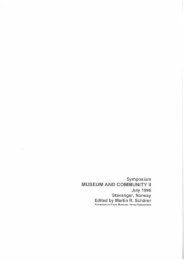Key Concepts of Museology - ICOM
Key Concepts of Museology - ICOM
Key Concepts of Museology - ICOM
Create successful ePaper yourself
Turn your PDF publications into a flip-book with our unique Google optimized e-Paper software.
50<br />
be incapable <strong>of</strong> using the resources<br />
<strong>of</strong> a library. This also explains experiences<br />
<strong>of</strong> visits adapted for blind or<br />
partially sighted people, where other<br />
senses are called in to play (hearing<br />
and especially touch) to discover<br />
the sensory aspects <strong>of</strong> the exhibits.<br />
A painting or a sculpture is made to<br />
be seen fi rst <strong>of</strong> all, and reference to<br />
a text (or reading a placard if there<br />
is one) only comes afterwards and<br />
is not absolutely essential. Thus we<br />
can say when <strong>of</strong> the museum that it<br />
fulfi ls a “sensory documentary function”<br />
(Deloche, 2007). (2) Marginalising<br />
reality, because the museum<br />
“specifi es itself while separating<br />
itself” (Lebensztein, 1981). Unlike a<br />
political fi eld where it is possible to<br />
theorise about the management <strong>of</strong><br />
the concrete lives <strong>of</strong> people in society<br />
through the mediation <strong>of</strong> institutions<br />
such as the State, that which is museal<br />
on the other hand serves to theorise<br />
about the way in which an institution<br />
creates, through separation and decontextualisation,<br />
in short through<br />
the putting into images, a space for<br />
sensory display “at the margin <strong>of</strong> all<br />
reality” (Sartre). This is the essence<br />
<strong>of</strong> a utopia, that is to say a completely<br />
imaginary space, certainly symbolic<br />
but not necessarily intangible.<br />
This second point characterises what<br />
one might call the utopian function<br />
<strong>of</strong> museums, because in order to<br />
change the world, one must be able<br />
to imagine it otherwise, and thus to<br />
distance oneself from it, which is<br />
why utopia as a fi ction is not necessarily<br />
a lack or a defi ciency, but rather<br />
the imagining <strong>of</strong> a different world.<br />
DERIVATIVES: MUSEAL FIELD, MUSEALIA,<br />
MUSEALITY, MUSEALISATION.<br />
CORRELATED: MUSEOLOGY, MUSEUM,<br />
MUSEUMIFICATION (PEJORATIVE), REALITY, SENSORY<br />
DISPLAY, SENSORY EXPERIENCE, SPECIFIC RELATION.<br />
MUSEALISATION<br />
n. – Equivalent in French: muséalisation;<br />
Spanish: musealisación; German: Musealisierung;<br />
Italian: musealizazione; Portuguese:<br />
musealisaçāo.<br />
In the accepted understanding <strong>of</strong><br />
the term, musealisation means the<br />
placing in the museum, or more<br />
generally, transforming a centre <strong>of</strong><br />
life, which may be a centre <strong>of</strong> human<br />
activity or a natural site, into a sort<br />
<strong>of</strong> museum. The expression ‘heritagisation’<br />
is undoubtedly a better description<br />
<strong>of</strong> this principle, which rests<br />
essentially on the idea <strong>of</strong> preservation<br />
<strong>of</strong> an object or a place, but does not<br />
cover the entire museal process. The<br />
neologism ‘museumifi cation’ translates<br />
the pejorative idea <strong>of</strong> the ‘petrifi -<br />
cation’ (or mummifi cation) <strong>of</strong> a living<br />
area, which may result from such a<br />
process and which may be found<br />
in numerous critical reviews about<br />
the ‘musealisation <strong>of</strong> the world’.<br />
From a strictly museological point<br />
<strong>of</strong> view, musealisation is the operation<br />
<strong>of</strong> trying to extract, physically<br />
or conceptually, something from its<br />
natural or cultural environment and<br />
giving it a museal status, transforming<br />
it into a musealium or ‘museum<br />
object’, that is to say, bringing it into<br />
the museal fi eld.
















